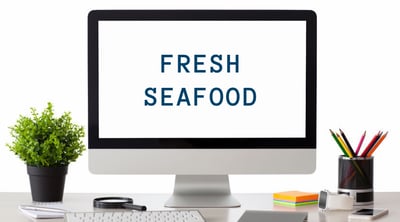Single Window Initiative (SWI): Survival Guide for importing fresh seafood
The new SWI landscape
The Single Window Initiative means several changes for importers:

• how you need to submit documentation is in flux;
• when that documentation is needed has changed; and
• which documentation is required is also shifting.
Our goal is to help you understand what is expected for the new “how, when, and what” of SWI requirements relating to the items you ship. These updates guide importers through specific commodities or categories of commodities, and the Participating Government Agencies (PGAs) that are affected.
How, when, and what
• Single Window Initiative requires all import documentation to be prepared and submitted before the shipment reaches customs.
• SWI is a new way of submitting documentation. All docs will be submitted using the Integrated Import Declaration (IID). Some of the requirements for how you submit are changing. For example: some documents that needed to be faxed now require an uploaded electronic image or just the document number.
• There may be changes to which documents are required under SWI.
• The launch date of SWI is still unknown, but it’s time to get proactive and adjust your workflow to ensure paperwork is ready before you ship.
Importing fresh seafood under SWI
This month, we’ll guide you through two example commodities.
1. Fresh salmon fillets from Chile, which is regulated by:
CFIA: Canadian Food Inspection Agency
2. Fresh squid from Rhode Island, U.S, which is regulated by:
CFIA: Canadian Food Inspection Agency
DFO: Fisheries and Oceans Canada – Aquatic Biotechnology Program
Fresh Atlantic salmon fillets
Unchanged requirements:
- Common name: Fresh Atlantic salmon fillet.
- Scientific name: Salmo salar.
- Other Government Department (OGD) extension code: 875400.
- End use: Retail sale.
- Registration requirements, which include: unit container type, number of packages, total weight/volume, number of units per package, unit weight, unit container unit of measure, lot code/size, brand name, and foreign processing establishment (name).
New or changed requirements under SWI:
- Safe Food for Canadians License or Fish Import Licence: De-Materialized Document (no images required, just the licence number).
Fresh squid
Unchanged requirements:
- Common name: Squid.
- Scientific name: Loligo opalescens.
- Other Government Department (OGD) extension code: 896101.
- End use code: Retail sale.
- Registration requirements, which include: unit container type, number of packages, total weight/volume, number of units per package, unit weight, unit container unit of measure, lot code/size, brand name, foreign processing establishment (name)
- Commodity identifier: Taxonomic Serial Number (TSN), which allows a clearer identification of the product and may expedite processing: TSN 573116.
- Genetic modification identifier, which says whether or not the commodity has been genetically modified or genetically engineered: For this example, the product has not been genetically modified.
Note: If the commodity has been genetically modified, the following information must be included:
- Common name
- Genus/species name
- Trademark name
- Life stage (propagate, embryo, juvenile, adult)
- Sex (male, female, other, sterile, hermaphrodite)
- Intended use (food, aquaculture, research and development, specialty chemical production [e.g. drugs, vitamin], environmental application, ornamental [aquarium, zoo], educational, other
- Genetic modification purpose (growth enhancement, disease resistance, shelf life extension, chemical/drug production, appearance, nutritional composition, laboratory animal model [human disease research], stress resistance, altered metabolic processes, altered dietary requirements, altered reproductive capacity, other)
- Commodity count (in “each”)
- Country of source
- Country of origin
- Manufacturer: name, address (street, city, province/state, post code, country)
- Harvesting party: name, address (street, city, province/state, post code, country)
New or changed requirements under SWI:
- Safe Food for Canadians Licence or Fish Import Licence: De-Materialized Document (no images required, just the licence number).
Why importers need to know
Under the new SWI, it’s important that you understand which Participating Government Agencies (PGAs) are regulating your products. Some products are regulated by multiple PGAs, and the PGAs regulating your products may have changed under SWI. Additionally, each PGA and the CBSA can issue penalties for incorrect and missing documents. Understanding what information and documentation is needed for clearance will make the clearance process into Canada smoother and more efficient.
Our guidance for importing fresh seafood
If you are importing fresh seafood, you’ll engage with the Canadian Food Inspection Agency, and in some cases, Fisheries and Oceans Canada.
Here are some things to consider when importing fresh seafood:
- Make sure to have the common name and scientific name of the product(s) you’re importing.
- Make sure you have the TSN (Taxonomic Serial Number) for the species.
- Provide your CFIA-issued Fish Import Licence number or Safe Food for Canadians Licence number to your broker.
- If you have a valid fish licence, you may use this to import seafood until it expires. Upon expiry, use the Safe Food for Canadians licence issued to your business. If your fish licence has already expired, use your Safe Food for Canadians Licence.
- Check to see if the species of fish you are importing is genetically modified. If it is, there will be additional details regarding the species for Fisheries and Oceans Canada.
For SWI, being proactive is your best strategy—gather all your information and documentation as far in advance as possible. Importers who know the requirements for the products they’re importing, and understand the new processes under SWI, will have a much smoother import experience.
As you adjust to the new requirements and workflow of the Single Window Initiative, we're here to help. Our customs team is ready to help you understand the SWI and its new requirements for your commodities.
SWI. It's what we do.

